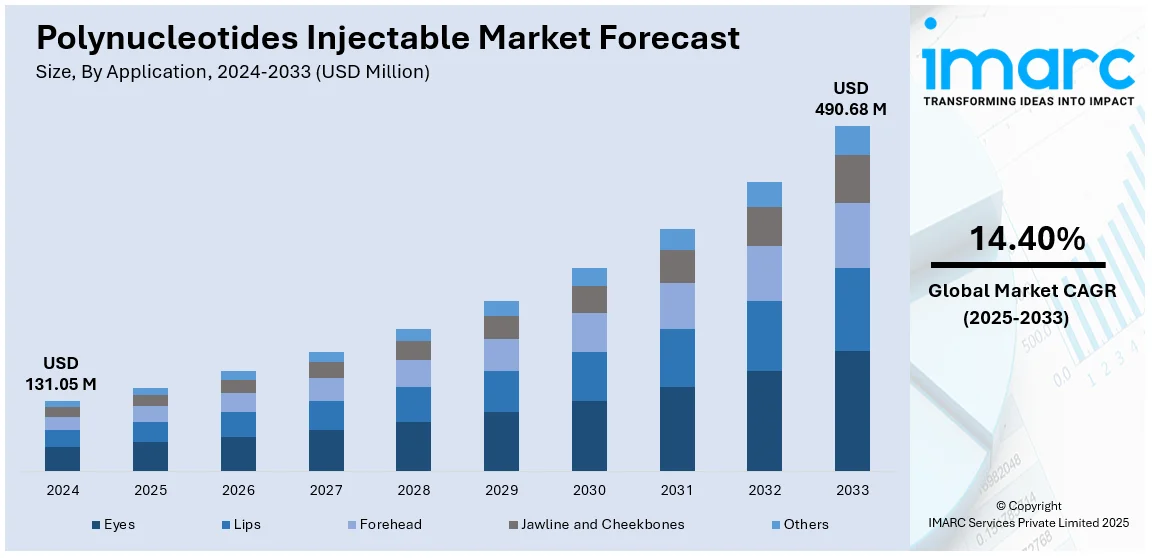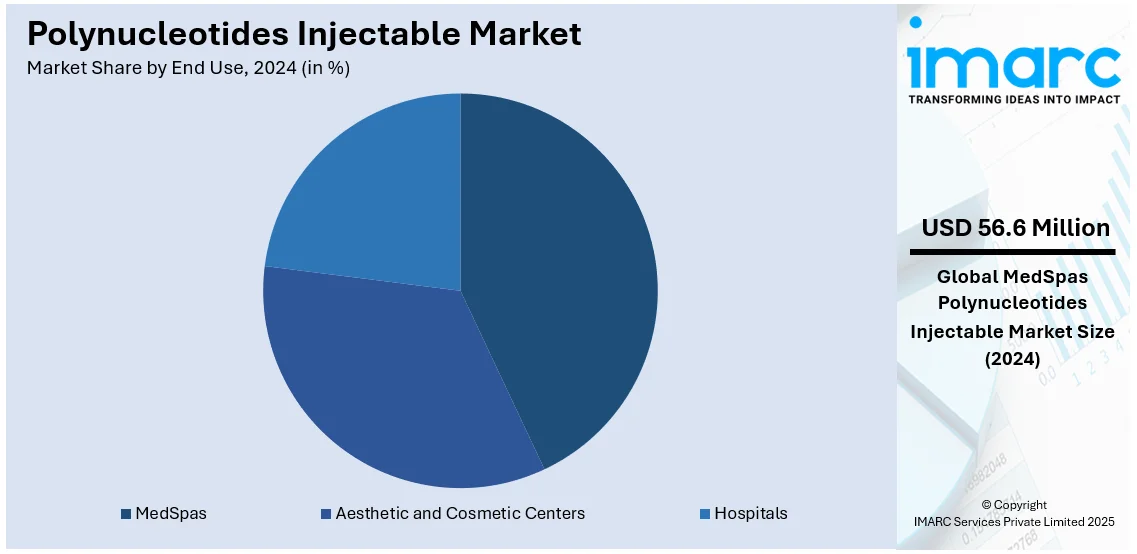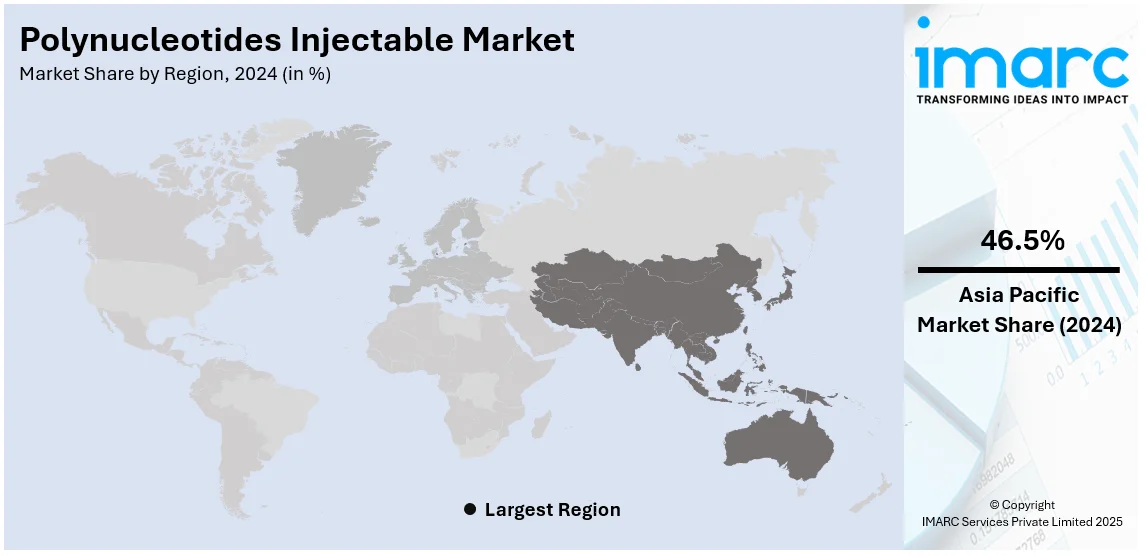
Polynucleotides Injectable Market Size, Share, Trends and Forecast by Application, End Use, and Region, 2025-2033
Polynucleotides Injectable Market Size and Share:
The global polynucleotides injectable market size was valued at USD 131.05 Million in 2024. Looking forward, IMARC Group estimates the market to reach USD 490.68 Million by 2033, exhibiting a CAGR of 14.40% from 2025-2033. Asia Pacific currently dominates the market, holding a market share of over 46.5% in 2024. The polynucleotides injectable market is driven by the increasing demand for advanced wound healing solutions, the growing popularity of aesthetic treatments like skin rejuvenation, and the rising adoption in chronic wound management are some of the key factors in the market growth.
|
Report Attribute
|
Key Statistics
|
|---|---|
|
Base Year
|
2024
|
|
Forecast Years
|
2025-2033
|
|
Historical Years
|
2019-2024
|
| Market Size in 2024 | USD 131.05 Million |
| Market Forecast in 2033 | USD 490.68 Million |
| Market Growth Rate (2025-2033) | 14.40% |
The increasing prevalence of diabetic foot ulcers (DFUs), affecting approximately 33 million individuals globally, is a key driver for the polynucleotides injectable market. These injectables, known for their regenerative properties, promote tissue repair and reduce inflammation in chronic wounds, such as DFUs, burns, and surgical incisions. By stimulating cellular regeneration and collagen production, polynucleotides enhance the natural healing process. With diabetes affecting a large portion of the global population, especially among aging individuals, the demand for effective wound-healing therapies is growing. Healthcare systems worldwide are focusing on improving wound care, further boosting the adoption of polynucleotide injectables as a solution. As awareness and clinical use of these therapies increase, the market for polynucleotides injectables is expanding rapidly, addressing the critical need for advanced wound care in diabetic patients and aging populations.

In the U.S., the polynucleotides injectable market holds 86.20% of the market share due to increasing demand for advanced therapeutic options in wound care and aesthetic treatments. The country’s healthcare system, known for its adoption of cutting-edge technologies, is seeing a rise in the use of polynucleotide injectables for skin rejuvenation, wound healing, and post-surgical recoveryIn addition, the increasing elderly population and the rise in chronic illnesses such as diabetes are driving the demand for efficient wound care solutions. U.S. healthcare providers are also leveraging polynucleotide injectables for their regenerative capabilities, further impelling the market growth and positioning the U.S. as a key player in the market.
Polynucleotides Injectable Market Trends:
Increasing Adoption of Aesthetic Treatments
A major trend in the polynucleotides injectable market is the growing use of these injectables in aesthetic treatments, particularly for skin rejuvenation and anti-aging therapies. Polynucleotides are well-known for their regenerative effects, promoting collagen synthesis and enhancing skin elasticity. As consumers seek non-invasive cosmetic treatments with minimal downtime, polynucleotides injectables are gaining popularity due to their effectiveness in addressing skin aging, fine lines, and wrinkles. Clinics and dermatologists are increasingly incorporating these products into their anti-aging treatment portfolios, as they offer a natural alternative to more invasive procedures like botox or fillers. This trend is especially noticeable in developed regions, where higher disposable incomes and a greater interest in cosmetic treatments prevail.
Growing Use in Chronic Wound Management
The growing use of polynucleotide injectables in chronic wound management is a notable trend in the healthcare sector. These injectables are increasingly utilized to treat non-healing wounds, burns, and diabetic ulcers due to their regenerative properties, which promote tissue regeneration, reduce inflammation, and accelerate healing. Approximately 6.3% of adults with diabetes develop diabetic foot ulcers (DFUs), equating to around 33 million individuals globally. With the increasing prevalence of chronic conditions such as diabetes, the demand for advanced wound care solutions is growing. Polynucleotide injectables are gaining traction as effective therapies for improving patient outcomes, reducing the need for prolonged treatments or hospitalization, and enhancing overall wound healing, aiding the market growth in this segment.
Regulatory Advancements and Market Expansion
Regulatory advancements are fueling the growth of the polynucleotides injectable market by enhancing their acceptance in medical and aesthetic treatments. In Europe, over 140 injectables have received approval, making them widely accessible in clinical settings. In this aspect, more and more products have started to penetrate markets as the respective regulatory bodies within key regions of the world streamline approval processes with the growing acknowledgement of the polynucleotide's therapeutic utility. In essence, this support allows manufacturers and care providers a healthy room for growth of the market. Furthermore, continuing research and clinical studies further legitimize the efficacy and safety of polynucleotide injectables, leading to greater adoption within wound care and aesthetic applications. In this respect, this trend furthers the general acceptance of polynucleotides injectables among various healthcare sectors.
Polynucleotides Injectable Industry Segmentation:
IMARC Group provides an analysis of the key trends in each segment of the global polynucleotides injectable market, along with forecast at the global, regional, and country levels from 2025-2033. The market has been categorized based on application and end use.
Analysis by Application:
- Eyes
- Lips
- Forehead
- Jawline and Cheekbones
- Others
Eyes stand as the largest component in 2024, holding around 62.5% of the market owing to the high demand for treatments targeting the delicate skin around the eyes, which is prone to signs of aging such as fine lines, wrinkles, and puffiness. Polynucleotides injectables increasingly remain as salves that provoke the growth of collagen and improve elastic capacity in the skin, thereby proving to be a non-invasive resource for the rejuvenation of the eye area. The surging interest in non-surgical aesthetic treatments, especially in under-eye areas and crow's feet, reflects significantly in this market share. With the increasing popularity of aesthetic treatments and an aging population, the eye segment is expected to be the market leader in the years to come.
Analysis by End Use:

- MedSpas
- Aesthetic and Cosmetic Centers
- Hospitals
MedSpas leads the market with around 43.2% of market share in 2024 driven by the increasing demand for non-invasive aesthetic treatments, with MedSpas offering a range of skin rejuvenation procedures. With most MedSpas providing minimal-invasive, effective, and quick treatments, it is easy to see why consumers are interested in improving signs of aging without the need for surgery. Polynucleotides injectables, which have already shown their ability to increase collagen production and skin elasticity, work well with the trend of improving facial aesthetics. Other than this, the increased awareness of MedSpas and its accessibility have pushed MedSpas's market share. MedSpas are expected to continue to play an important role in the growth of the polynucleotides injectable market as consumers increasingly focus on skincare and anti-aging treatments.
Regional Analysis:

- North America
- United States
- Canada
- Asia Pacific
- China
- Japan
- India
- South Korea
- Australia
- Indonesia
- Others
- Europe
- Germany
- France
- United Kingdom
- Italy
- Spain
- Others
- Latin America
- Brazil
- Mexico
- Others
- Middle East
- Africa
In 2024, the Asia Pacific region held the largest market share, exceeding 46.5%, driven by increased healthcare investments, rising disposable incomes, and its large, diverse population. Countries like Japan, China, and South Korea are at the forefront, adopting advanced medical technologies and aesthetic treatments, driving demand for polynucleotide injectables. The region's aging population and rising chronic conditions, particularly diabetes, are creating a significant need for effective wound care solutions. Additionally, the popularity of non-invasive cosmetic procedures for skin rejuvenation is bolstering the market growth. With improving healthcare infrastructure and growing awareness of the benefits of polynucleotide injectables, Asia Pacific is set to continue its leading position in the market.
Key Regional Takeaways:
North America Polynucleotides Injectable Market Analysis
The North American polynucleotides injectable market is witnessing significant growth, primarily driven by advancements in medical aesthetics and wound care. The increasing adoption of non-invasive aesthetic treatments, particularly for skin rejuvenation and anti-aging therapies, is one of the major factors fueling market demand. Polynucleotide injectables are gaining increasing popularity as they provide the stimulation of collagen production and improve skin elasticity, which is highly demanded by individuals to enhance the appearance of the skin. Moreover, the growing aged population and the rise of chronic diseases that include diabetes and vascular diseases are pushing the demand for effective wound-healing treatments. Polynucleotide injectables are increasingly being used for chronic wound management, as they promote tissue regeneration and reduce healing time. The U.S. healthcare system's strong infrastructure, along with favorable regulatory conditions, is further propelling market growth. With major players directing their focus to research and new product development, North America will continue to be at the forefront globally in the market for polynucleotides injectable.
United States Polynucleotides Injectable Market Analysis
The United States dominates the global polynucleotides injectable market due to its robust demand for innovative medical and aesthetic solutions. The increasing application of polynucleotide injectables in skin rejuvenation and chronic wound management is driving market expansion. A key factor driving this growth is the aging population and the increasing prevalence of chronic conditions like diabetes, which necessitate advanced wound healing treatments. Polynucleotide injectables are gaining traction for their ability to promote tissue regeneration, enhance skin elasticity, and accelerate the healing process, particularly in diabetic ulcers, surgical wounds, and burns. In addition, the surge in non-invasive cosmetic procedures, driven by consumer preference for safer and less invasive treatments, has further bolstered the adoption of these injectables in dermatology. U.S. healthcare professionals are increasingly utilizing polynucleotides for both aesthetic applications and medical treatments, given their regenerative benefits. With favorable regulatory frameworks, strong healthcare infrastructure, and continuous innovation in the field, the U.S. remains a key player in the growth of the polynucleotide injectable market.
Europe Polynucleotides Injectable Market Analysis
The European market for injectable polynucleotides has witnessed consistent growth in recent times due to rising demand for aesthetic treatments and quality wound care products. The growth in the elderly population in Europe is associated with a higher incidence rate of diabetes; hence, proper therapy for wounds, which enhances quicker and more effective healing, has gained greater demand. Polynucleotide injectables are more and more frequently used in chronic wound management owing to their regenerative properties, promising new treatment options for diabetic ulcers, burns, and post-surgical recovery. There is also the growing trend in minimally invasive cosmetic procedures in the areas of skin rejuvenation and anti-aging treatments that would further expand this market. The European market has a strong regulatory environment, and the leaders in this adoption are Germany, France, and the UK. A rising level of awareness of the advantages of the polynucleotide injectables among both consumers and health care providers is driving demand. As such, the market in Europe is going to continue growing steadily during the next years.
Asia Pacific Polynucleotides Injectable Market Analysis
The polynucleotides injectable market in Asia Pacific is expanding rapidly, driven by growing healthcare investments, a large population, and rising disposable incomes. Countries such as Japan, China, and South Korea are increasingly adopting advanced medical treatments, including polynucleotide injectables for both wound care and aesthetic applications. The demand for non-invasive cosmetic procedures, particularly for skin rejuvenation, is rising as the region’s population ages. The increasing trend of chronic diseases like diabetes is also helping the market by increasing the demand for effective wound care management. More developed healthcare systems and increased awareness are adding to the growing market in this region.
Latin America Polynucleotides Injectable Market Analysis
The Latin American injectable market of polynucleotides is experiencing moderate growth. This market is primarily fueled by awareness about healthcare as well as the adoption of aesthetic treatments. Countries such as Brazil and Mexico are witnessing high demand for therapies of skin rejuvenation, in which polynucleotide injectables offer the most non-invasive solutions. The management of chronic wounds also comes into notice with the growth in the prevalence of diabetes and many other conditions. The market benefits from expanding healthcare access and regulatory support, though adoption rates are slower compared to more developed regions.
Middle East and Africa Polynucleotides Injectable Market Analysis
The polynucleotides injectable market in the Middle East and Africa is growing, driven by increasing awareness of advanced wound care and aesthetic treatments. Countries like the UAE and Saudi Arabia are adopting polynucleotide injectables for skin rejuvenation and managing chronic wounds, particularly in aging populations. However, market growth remains steady due to differences in healthcare infrastructure and economic conditions across regions. The demand for non-invasive cosmetic procedures is expected to rise, contributing to further market expansion in the region.
Competitive Landscape:
The competitive landscape of the injectable polynucleotides market is filled with a multitude of key players focused on innovating and designing products. Aesthetic and medicinal uses are currently being targeted as companies look for ways to maximize the efficacy and safety profiles of their injectables. Strategic expansion into the marketplace often involves partnerships and acquisitions, often involving healthcare provider collaboration. Most of the market players engage in clinical studies and research on the formulations for improving products with a regulatory endorsement. Competition exists at a significant level with pricing, quality, and technology because the companies intend to offer something better to treat wound healing, skin rejuvenation, and chronic conditions. All this makes an environment for continuously improved products as well as enlarged market opportunities.
The report provides a comprehensive analysis of the competitive landscape in the polynucleotides injectable market with detailed profiles of all major companies, including:
- Ameela
- Fox Group International
- HTL Biotechnology
- Mastelli Srl
- PharmaResearch
- Promoitalia Group Spa
Latest News and Developments:
- In August 2024, Thérapie Clinic, Ireland's leading medical aesthetic group, is launching Polynucleotides, an innovative injectable bio-stimulator, across all 70+ clinics. Proven to reduce fine lines and wrinkles by 91%, Polynucleotides stimulate fibroblast cells to boost collagen production, resulting in firmer skin and a more youthful appearance. Nurse Nicky, Head of Injectable Growth, calls it the "king of skin treatments," emphasizing its transformative potential for aesthetic care.
- In February 2024, REJURAN, the innovative 'salmon sperm injections,' officially launched in Australia. This gel formulation of polynucleotides, derived from wild salmon DNA through proprietary DOT™ technology, promotes skin restoration and repair. Unlike traditional hyaluronic acid boosters, REJURAN reduces inflammation while rejuvenating skin. Popular in South Korea since 2015, REJURAN is now available in Australia and New Zealand through exclusive distributor K Bridge Medical, with celebrities like Jennifer Aniston reportedly using it.
Polynucleotides Injectable Market Report Scope:
| Report Features | Details |
|---|---|
| Base Year of the Analysis | 2024 |
| Historical Period | 2019-2024 |
| Forecast Period | 2025-2033 |
| Units | Million USD |
| Scope of the Report | Exploration of Historical Trends and Market Outlook, Industry Catalysts and Challenges, Segment-Wise Historical and Future Market Assessment:
|
| Applications Covered | Eyes, Lips, Forehead, Jawline and Cheekbones, Others |
| End Uses Covered | MedSpas, Aesthetic and Cosmetic Centers, Hospitals |
| Regions Covered | Asia Pacific, Europe, North America, Latin America, Middle East and Africa |
| Countries Covered | United States, Canada, Germany, France, United Kingdom, Italy, Spain, China, Japan, India, South Korea, Australia, Indonesia, Brazil, Mexico |
| Companies Covered | Ameela, Fox Group International, HTL Biotechnology, Mastelli Srl, PharmaResearch, Promoitalia Group Spa, etc. |
| Customization Scope | 10% Free Customization |
| Post-Sale Analyst Support | 10-12 Weeks |
| Delivery Format | PDF and Excel through Email (We can also provide the editable version of the report in PPT/Word format on special request) |
Key Benefits for Stakeholders:
- IMARC’s report offers a comprehensive quantitative analysis of various market segments, historical and current market trends, market forecasts, and dynamics of the polynucleotides injectable market from 2019-2033.
- The research study provides the latest information on the market drivers, challenges, and opportunities in the global polynucleotides injectable market.
- The study maps the leading, as well as the fastest-growing, regional markets. It further enables stakeholders to identify the key country-level markets within each region.
- Porter's Five Forces analysis assists stakeholders in assessing the impact of new entrants, competitive rivalry, supplier power, buyer power, and the threat of substitution. It helps stakeholders to analyze the level of competition within the polynucleotides injectable industry and its attractiveness.
- Competitive landscape allows stakeholders to understand their competitive environment and provides an insight into the current positions of key players in the market.
Key Questions Answered in This Report
The global polynucleotides injectable market was valued at USD 131.05 Million in 2024.
The global polynucleotides injectable market is estimated to reach USD 490.68 Million by 2033, exhibiting a CAGR of 14.40% from 2025-2033.
Key words in polynucleotides injectables include bio-stimulator, DNA fragments, collagen production, skin rejuvenation, anti-aging, tissue regeneration, wound healing, fibroblast stimulation, non-invasive treatment, aesthetic procedures, polynucleotides gel, bio-active molecules, DNA science, inflammation reduction, and regenerative medicine.
Asia Pacific currently dominates the polynucleotides injectable market, holding a market share of over 46.5% in 2024. The dominance is driven by growing demand for aesthetic treatments, expanding healthcare infrastructure, and technological advancements.
Some of the major players in the global polynucleotides injectable market include Ameela, Fox Group International, HTL Biotechnology, Mastelli Srl, PharmaResearch, Promoitalia Group Spa, etc.
Need more help?
- Speak to our experienced analysts for insights on the current market scenarios.
- Include additional segments and countries to customize the report as per your requirement.
- Gain an unparalleled competitive advantage in your domain by understanding how to utilize the report and positively impacting your operations and revenue.
- For further assistance, please connect with our analysts.
 Request Customization
Request Customization
 Speak to an Analyst
Speak to an Analyst
 Request Brochure
Request Brochure
 Inquire Before Buying
Inquire Before Buying




.webp)




.webp)












